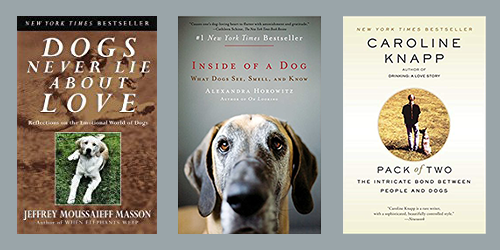
Describing the bond between people and their dogs could fill an entire library; my three favorite books involve a combination of scientific observation and simple affection. In Dogs Never Lie About Love: Reflections on the Emotional World of Dogs, Jeffrey Moussaieff Masson observes dogs in general and his own pack of three specifically – how they enjoy each other, and him, and live enthusiastically in the moment. Dogs, he says, 'do not have to hide their joie de vivre for fear of appearing naïve, and they do not need to feign boredom when they are in fact interested for fear of appearing unsophisticated.' Dogs love us unconditionally; they follow us from room to room, Masson theorizes, 'just because they like to be near us.' He explores how dogs play, why they wag their tails, why they bark, how they use each of their senses, and adds 'It may well be that dogs possess senses and abilities that we completely ignore … Dogs are still mysterious creatures in spite of more than ten thousand years of companionship with humans.'
In Inside of a Dog: What Dogs See, Smell and Know, Alexandra Horowitz continues this examination using her training as a cognitive scientist, punctuated with completely subjective words like 'adorable.' Her writing is both earthy and entertaining; for example, she describes dog urination as a 'bellowing self-promotion.' While we are visual animals, Horowitz explains, dogs experience the world through smell, then sound, then sight. Even if I know this, it's a delight to read sentences like 'When a dog turns his head toward you, it is not so much to look at you with his eyes; rather, it is to get his nose to look at you.'
Horowitz studied her dog Pumpernickel and others interacting with each other and researched more formal experiments. Her observations are both familiar and surprising. Dogs develop like children, using attention-getting behavior. However, contrary to all the internet videos and memes of 'dog shaming,' dogs don't feel guilt - they only sense your reaction and exhibit submissive behavior. Inside of a Dog explores what Horowitz calls the dog umwelt, or world view.
In addition to being 'smelly,' it is 'close to the ground; it is lickable. It either fits in the mouth or it doesn't. It is in the moment. It is full of details, fleeting, and fast. It is written all over their faces.' This doggy honesty echoes Masson's wonderful title, Dogs Never Lie About Love. Horowitz also honors the everyday pleasures and naturalness of bonding with a dog. The book ends with ideas for enriching your dog's life and deepening that bond, including taking your dog for a leisurely 'smell walk,' giving him more things to do, and reading your dog's behavior – in general, imagining the world from your dog's point of view. (I wish sometimes that we kept our hardback book covers – Inside of a Dog's front cover is a full face photo of an imploring-eyed, lop-eared hound. The back cover photo is the back of the dog's head, placing us as readers 'inside' the dog's head.)
Above both these books, though, I'd recommend the highly quotable Pack of Two: The Intricate Bond Between People and Dogs by Caroline Knapp. It's written with such frank vulnerability, and so much affection for her dog, a reader is drawn into the closeness of the pair. Knapp adopted her dog Lucille after losing both parents and deciding to quit drinking. From the first description of this Shepherd mix (shelter-speak for 'We Really Have No Idea'), I was as fascinated as the author with every furry, funny detail. More than a story of an 'emotional support' pet, Pack of Two is a story about love, 'mutual and unambiguous and exceptionally private' and 'no less valid because one of the partners happens to move on four legs.'
Knapp's discoveries of the joys of playing with her dog come alive on the page without sentimentality, because she also reveals how dogs test and exasperate their people. Dogs can find and push your buttons – but they also sense your emotional needs and fill them without hesitation. Knapp questions the term 'unconditional love,' though, finding it thin and lacking. Dogs also need respect and care, and they need us to love them. In return, they love us 'with a kind of focus and constancy that's rare, if not unparalleled, among even the most devoted family members.'
A few times in Pack of Two Knapp looks defensively to a world of non-dog-lovers who may judge her as extreme or weird. She quotes other dog owners, writers, veterinarians and researchers to give further insight. Two of my favorites are the man who says he wakes up every morning to the view of his dog's nose, not poking him but just waiting – and the woman who says her dog 'seems to wake up every morning with a thought balloon over her head that says, Yahoo!' To live with such an energetic and loyal friend can be demanding, but it's certainly rewarding. As Caroline Knapp says, 'All dogs can be guide dogs of a sort, leading us to places we didn't even know we needed or wanted to go.'
by Jan Hardy, Cataloging Specialist
